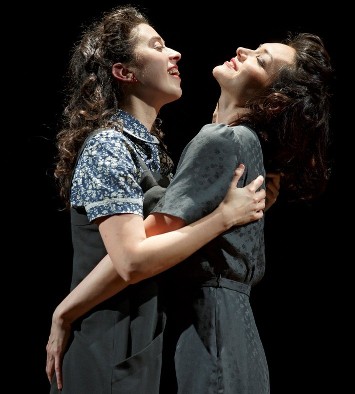Indecent

Adina Verson and Katrina Lenk. Photo by Carol Rosegg
Reviewed by Elizabeth Ahlfors
A kiss is just a kiss -- unless it is between two women on Broadway in 1923. Fears that the lesbian content of Sholem Asch's God of Vengeance, would inflame anti-Semitism is what sent New York's Vice Squad to quickly close the controversial European play and keep it off New York stages for 93 years.
Playwright Paula Vogel's new backstage play, Indecent, now playing at Vineyard Theatre, takes us behind Asch's century-old drama . Vogel co-created the play with Rebecca Taichman whose direction adds theatricality and music that captures the social mores, hypocrisy, culture and the power of art.
In 1906, Asch, a Polish Jew, wrote, The God of Vengeance, a Yiddish tale of a God-fearing man who seemed to enjoy a respectable life with his wife and daughter. What many did not know was that in his basement, he ran a brothel. Problems arose when his 17-year-old virginal daughter fell in love with one of the prostitutes. Furiously, the father banished his daughter to the basement with the prostitutes and threw the Torah to the ground.
The God of Vengeance was performed throughout Europe in the early part of the 20th century and was then translated into English and brought to the Provincetown Playhouse in New York. When it moved uptown to Broadway's Apollo Theater with it's theme of a lesbian relationship, the cast and producer were indicted and convicted of obscenity. Interestingly, the judge did not mention lesbianism as the main obscenity, stating that he resented the “desecration of the sacred scrolls of the Torah.” The play returned to Europe.
Writing Indecent, at Yale Rep, Vogel (How I Learned to Drive) followed the history of this provocative drama and its artists devoted to performing it in Europe through two World Wars, and the holocaust. The tale is told in a series of quick scenes, blending past and present, portrayed with touching humor, joy, and pathos by seven actors playing multiple roles. Taichman (Familiar, Stage Kiss) adds projections, vivid staging and songs, galvanizing choreography by David Dorfman, and three klezmer musicians on Riccardo Hernandez's wood-planked stage platform. Music and music direction are by Lisa Gutkin and Aaron Halva.
The severe shadowy lighting by Christopher Akerlind points forebodingly to a tragic ending, recalling Lemml's prophetic words at the top of the play, "Every night we tell this story, but somehow I can never remember the end."
The cast was set at Yale and remains the same, everyone playing multiple roles with sharp nuances. Using suitcases as props, the cast is costumed in drab costumes. Outstanding is Richard Topol as Lemml, a sensitive, likeable narrator who is spellbound by the first reading of Asch's play. Enthusiastic and always supportive, he becomes the stage manager, dedicating himself to guiding the play through the decades until the final performances in the ghetto in Lodz. Katrina Lenk (Manke) and Adina Verson (Rifkele) are lovely as the lovers, bringing a natural grace to the rain scene. Other performers are Max Gordon Moore as Sholem Asch, Tom Nelis, Mimi Lieber, and Steven Rattazzi.
Standing out is the drama's beginning and ending with an imaginative metaphor of dust alluding to time and humanity, a fascinating production of intense sensitivity and the inherent constancy of the human spirit.
Indecent
Vineyard Theater
108 -East 15nd Street
http://www.vineyardtheatre.org/
Produced in association with La Jolla Playhouse and Yale Repertory Theatre
Opened: April 27, 2016. Closes: June 19, 2016
One hours, 40 minutes. One intermission
Co-created by Paula Vogel and Rebecca Taichman
Playwright: Paula Vogel
Directed by Rebecca Taichman
Cast: Katrina Lenk, Mimi Lieber, Max Gordon Moore, Tom Nelis, Steven Rattazzi, Richard Topol, Adina Verson
Reviewed by Elizabeth Ahlfors